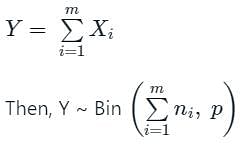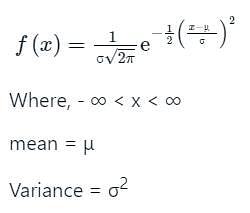Civil Engineering (CE) Exam > Civil Engineering (CE) Questions > Consider a binomial random variable X. If X1,...
Start Learning for Free
Consider a binomial random variable X. If X1, X2,...Xn are independent and identically distributed samples from the distribution of X with sum  then the distribution of Y as n → ∞ can be approximated as.
then the distribution of Y as n → ∞ can be approximated as.
 then the distribution of Y as n → ∞ can be approximated as.
then the distribution of Y as n → ∞ can be approximated as.- a)Exponential
- b)Bernoulli
- c)Binomial
- d)Normal
Correct answer is option 'C'. Can you explain this answer?
| FREE This question is part of | Download PDF Attempt this Test |
Most Upvoted Answer
Consider a binomial random variable X. If X1, X2,...Xnare independent ...
Binomial Distribution:
A binomial distribution is a common probability distribution that occurs in practice. It arises in the following situation:
- There are n independent trials.
- Each trial results in a "success" or "failure"
- The probability of success in each and every trial is equal to 'p'.
If the random variable X counts the number of successes in the n trials, then X has a binomial distribution with parameters n and p.
X ~ Bin (n, p).
Properties of Binomial distribution:
If X ~ Bin (n, p), then the probability mass function of the binomial distribution is
f (x) = P (X =x) = nCr px(1 - p)n - x
for x = 0, 1, 2, 3,...,n
Mean E (X) = μ = np.
Variance (σ2) = np(1 - p).
Note:

Theorem:
Let X1, X2, ..., Xm be independent random variables such that Xi has a BIn (ni, p) distribution, for i = 1, 2, ..., m. Let

Bernoulli Distribution:
- A Bernoulli experiment/trial has only two possible outcomes, e.g. success/failure, heads/tails, female/male, defective/non-defective, etc.
- The outcomes are typically coded as 0 (failure) or 1 (success).
X ~ Bern (p)
P (X = 1) = 1, P (X = 0) = 1 - p, 0≤p≤1
Properties:
- The probability mass function is p(x) = px (1 - p)1 - x for x = 0, 1.
- The mean is E (X) = μ = (1 × p) + 0 × (1 - p) = p
- Since E (X2) = (12 × p) + 02 × (1 - p) = p,
- σ2 = var (X) = E (X2) - μ2 = p - p2 = p (1 - p).
Note:
The Bernoulli distribution is a special case of binomial distribution with n = 1.
Exponential Distribution:
The probability density function of the exponential distribution is,

Normal Distribution:
The probability density function of normal distribution is given by,

Attention Civil Engineering (CE) Students!
To make sure you are not studying endlessly, EduRev has designed Civil Engineering (CE) study material, with Structured Courses, Videos, & Test Series. Plus get personalized analysis, doubt solving and improvement plans to achieve a great score in Civil Engineering (CE).

|
Explore Courses for Civil Engineering (CE) exam
|

|
Similar Civil Engineering (CE) Doubts
Consider a binomial random variable X. If X1, X2,...Xnare independent and identically distributed samples from the distribution of X with sumthen the distribution of Y as n→∞ can be approximated as.a)Exponentialb)Bernoullic)Binomiald)NormalCorrect answer is option 'C'. Can you explain this answer?
Question Description
Consider a binomial random variable X. If X1, X2,...Xnare independent and identically distributed samples from the distribution of X with sumthen the distribution of Y as n→∞ can be approximated as.a)Exponentialb)Bernoullic)Binomiald)NormalCorrect answer is option 'C'. Can you explain this answer? for Civil Engineering (CE) 2024 is part of Civil Engineering (CE) preparation. The Question and answers have been prepared according to the Civil Engineering (CE) exam syllabus. Information about Consider a binomial random variable X. If X1, X2,...Xnare independent and identically distributed samples from the distribution of X with sumthen the distribution of Y as n→∞ can be approximated as.a)Exponentialb)Bernoullic)Binomiald)NormalCorrect answer is option 'C'. Can you explain this answer? covers all topics & solutions for Civil Engineering (CE) 2024 Exam. Find important definitions, questions, meanings, examples, exercises and tests below for Consider a binomial random variable X. If X1, X2,...Xnare independent and identically distributed samples from the distribution of X with sumthen the distribution of Y as n→∞ can be approximated as.a)Exponentialb)Bernoullic)Binomiald)NormalCorrect answer is option 'C'. Can you explain this answer?.
Consider a binomial random variable X. If X1, X2,...Xnare independent and identically distributed samples from the distribution of X with sumthen the distribution of Y as n→∞ can be approximated as.a)Exponentialb)Bernoullic)Binomiald)NormalCorrect answer is option 'C'. Can you explain this answer? for Civil Engineering (CE) 2024 is part of Civil Engineering (CE) preparation. The Question and answers have been prepared according to the Civil Engineering (CE) exam syllabus. Information about Consider a binomial random variable X. If X1, X2,...Xnare independent and identically distributed samples from the distribution of X with sumthen the distribution of Y as n→∞ can be approximated as.a)Exponentialb)Bernoullic)Binomiald)NormalCorrect answer is option 'C'. Can you explain this answer? covers all topics & solutions for Civil Engineering (CE) 2024 Exam. Find important definitions, questions, meanings, examples, exercises and tests below for Consider a binomial random variable X. If X1, X2,...Xnare independent and identically distributed samples from the distribution of X with sumthen the distribution of Y as n→∞ can be approximated as.a)Exponentialb)Bernoullic)Binomiald)NormalCorrect answer is option 'C'. Can you explain this answer?.
Solutions for Consider a binomial random variable X. If X1, X2,...Xnare independent and identically distributed samples from the distribution of X with sumthen the distribution of Y as n→∞ can be approximated as.a)Exponentialb)Bernoullic)Binomiald)NormalCorrect answer is option 'C'. Can you explain this answer? in English & in Hindi are available as part of our courses for Civil Engineering (CE).
Download more important topics, notes, lectures and mock test series for Civil Engineering (CE) Exam by signing up for free.
Here you can find the meaning of Consider a binomial random variable X. If X1, X2,...Xnare independent and identically distributed samples from the distribution of X with sumthen the distribution of Y as n→∞ can be approximated as.a)Exponentialb)Bernoullic)Binomiald)NormalCorrect answer is option 'C'. Can you explain this answer? defined & explained in the simplest way possible. Besides giving the explanation of
Consider a binomial random variable X. If X1, X2,...Xnare independent and identically distributed samples from the distribution of X with sumthen the distribution of Y as n→∞ can be approximated as.a)Exponentialb)Bernoullic)Binomiald)NormalCorrect answer is option 'C'. Can you explain this answer?, a detailed solution for Consider a binomial random variable X. If X1, X2,...Xnare independent and identically distributed samples from the distribution of X with sumthen the distribution of Y as n→∞ can be approximated as.a)Exponentialb)Bernoullic)Binomiald)NormalCorrect answer is option 'C'. Can you explain this answer? has been provided alongside types of Consider a binomial random variable X. If X1, X2,...Xnare independent and identically distributed samples from the distribution of X with sumthen the distribution of Y as n→∞ can be approximated as.a)Exponentialb)Bernoullic)Binomiald)NormalCorrect answer is option 'C'. Can you explain this answer? theory, EduRev gives you an
ample number of questions to practice Consider a binomial random variable X. If X1, X2,...Xnare independent and identically distributed samples from the distribution of X with sumthen the distribution of Y as n→∞ can be approximated as.a)Exponentialb)Bernoullic)Binomiald)NormalCorrect answer is option 'C'. Can you explain this answer? tests, examples and also practice Civil Engineering (CE) tests.

|
Explore Courses for Civil Engineering (CE) exam
|

|
Suggested Free Tests
Signup for Free!
Signup to see your scores go up within 7 days! Learn & Practice with 1000+ FREE Notes, Videos & Tests.
























